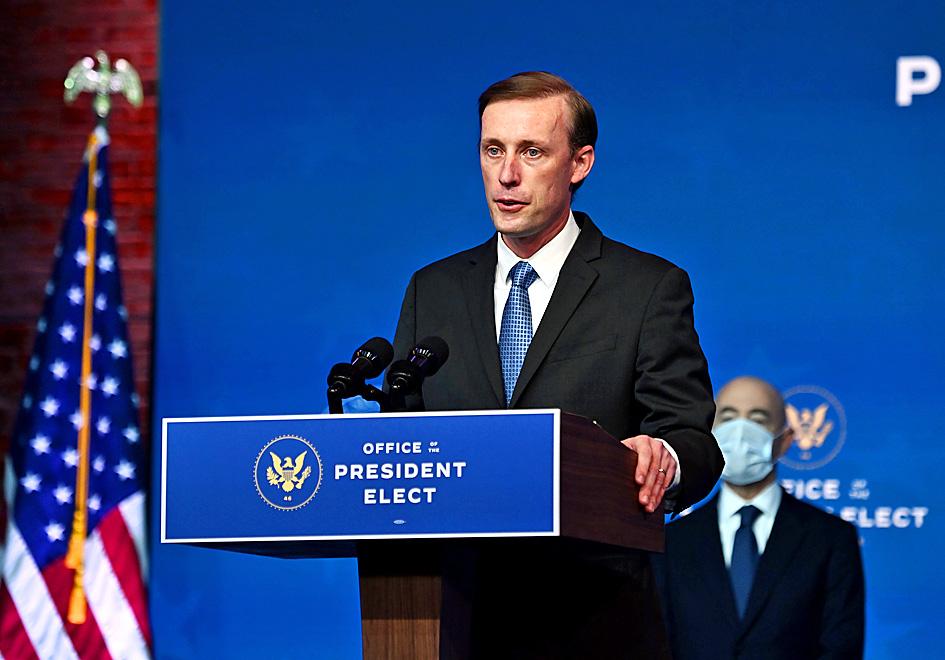The US must be prepared to “impose costs” on China for its bellicosity and threats toward Taiwan, as well its actions in Hong Kong and Xinjiang, US National Security Adviser Jake Sullivan said on Friday.
Sullivan made the comments during an online discussion with Robert O’Brien, his predecessor from the administration of former US president Donald Trump, on the transition of power and US foreign policy.
The discussion was hosted by the Washington-based United States Institute of Peace.

Photo: AFP
O’Brien named China as the top foreign policy challenge being handed over to US President Joe Biden, citing its increasingly “assertive” approach to Taiwan, Hong Kong, the South China Sea and India.
In response, Sullivan proposed four steps the US can take to contend with the challenges that China poses.
The first step, Sullivan said, is to recognize that Beijing is making the case that the Chinese model is better than the US model, and is pointing to dysfunction and division in the US as evidence of this claim.
To combat this argument, the US must “refurbish the foundations of [its] democracy” by tackling social problems, such as racial and economic inequality, he said.
Second, the US would be most effective in advancing its vision for a free, prosperous and equitable society if it does so “in lockstep with its democratic allies and partners,” Sullivan said.
With its allies in Europe and Asia, the US can lead “a chorus of voices” that collectively represents more than half of the world’s economy, which would give it “leverage” to stand up to Chinese pressure, he said.
Third, the US must increase public investment in emerging technologies, such as artificial intelligence, quantum computing, biotechnology and clean energy, as a great deal of the competition between the US and China would be decided by which country enjoys a technological advantage, he added.
The last step is for the US to speak with clarity and consistency in regards to China and other foreign policy issues, Sullivan said.
Specifically, this includes “being prepared to act as well as to impose costs for what China is doing in Xinjiang, what it’s doing in Hong Kong, and for the bellicosity and threats that it is projecting toward Taiwan,” he said.
Meanwhile, in a conversation on Friday with the Philadelphia-based Foreign Policy Research Institute, Representative to the US Hsiao Bi-khim (蕭美琴) said that Taiwan-US ties were “off to a good start” under the Biden administration.
Asked about the widespread support in Taiwan for Trump, which put the nation at odds with many other democratic countries, Hsiao said that Taiwan’s government “never takes a position on domestic US politics.”

MAKING WAVES: China’s maritime militia could become a nontraditional threat in war, clogging up shipping lanes to prevent US or Japanese intervention, a report said About 1,900 Chinese ships flying flags of convenience and fishing vessels that participated in China’s military exercises around Taiwan last month and in January have been listed for monitoring, Coast Guard Administration (CGA) Deputy Director-General Hsieh Ching-chin (謝慶欽) said yesterday. Following amendments to the Commercial Port Act (商港法) and the Law of Ships (船舶法) last month, the CGA can designate possible berthing areas or deny ports of call for vessels suspected of loitering around areas where undersea cables can be accessed, Oceans Affairs Council Minister Kuan Bi-ling (管碧玲) said. The list of suspected ships, originally 300, had risen to about 1,900 as

Right-wing political scientist Laura Fernandez on Sunday won Costa Rica’s presidential election by a landslide, after promising to crack down on rising violence linked to the cocaine trade. Fernandez’s nearest rival, economist Alvaro Ramos, conceded defeat as results showed the ruling party far exceeding the threshold of 40 percent needed to avoid a runoff. With 94 percent of polling stations counted, the political heir of outgoing Costa Rican President Rodrigo Chaves had captured 48.3 percent of the vote compared with Ramos’ 33.4 percent, the Supreme Electoral Tribunal said. As soon as the first results were announced, members of Fernandez’s Sovereign People’s Party

Japan’s strategic alliance with the US would collapse if Tokyo were to turn away from a conflict in Taiwan, Japanese Prime Minister Sanae Takaichi said yesterday, but distanced herself from previous comments that suggested a possible military response in such an event. Takaichi expressed her latest views on a nationally broadcast TV program late on Monday, where an opposition party leader criticized her for igniting tensions with China with the earlier remarks. Ties between Japan and China have sunk to the worst level in years after Takaichi said in November that a hypothetical Chinese attack on Taiwan could bring about a Japanese

MORE RESPONSIBILITY: Draftees would be expected to fight alongside professional soldiers, likely requiring the transformation of some training brigades into combat units The armed forces are to start incorporating new conscripts into combined arms brigades this year to enhance combat readiness, the Executive Yuan’s latest policy report said. The new policy would affect Taiwanese men entering the military for their compulsory service, which was extended to one year under reforms by then-president Tsai Ing-wen (蔡英文) in 2022. The conscripts would be trained to operate machine guns, uncrewed aerial vehicles, anti-tank guided missile launchers and Stinger air defense systems, the report said, adding that the basic training would be lengthened to eight weeks. After basic training, conscripts would be sorted into infantry battalions that would take